The 3rd African Writers Conference took place in Lusaka, Zambia from 5th to 7th November, 2020- the year in which the continent had to adjust to the global Covid-19 pandemic. Following health guidelines, only fifty people were physically allowed to occupy the library at the French Cultural Centre where the event was held, from the 400 who had registered online to be there. The entire conference was streamed on Facebook Live, starting with the opening evening session on Thursday 5th November. Twenty countries tuned in. The theme of the Conference was ‘The African Identity’, and so, this Writers Mingle (online-only) session was about just that: defining the African identity and its relationship with contemporary arts, especially writing. Seventy participants took part in this Zoom session that went on for two hours and six minutes – because no one wanted it to end!
Moderating proceedings was Anthony Onugba, founder of Writers Space Africa and Executive Director of the African Writers Development Trust, who travelled to Zambia from Nigeria for the conference.
On what African identity is, what emerged were i) our physical characteristics: kinky hair, melanin, from the darkest blue to the palest white; ii) stereotypes imposed on us which end up being part of African identity, such as images of starving babies with flies across their mouths, corruption, HIV/AIDS, etc.; iii) having a love for the continent, being engrossed in her problems and solutions; iv) self-love: understanding where you come from and how you see yourself before anyone else sees you; iv) how you show the world who you are and how they see you from what you portray.
Read – Breaking stereotypes in Nairobi – 2019 African Writers Conference in Perspective
With regards to African identity and contemporary arts, it was noted that contemporary arts must be about showing how society is in the present moment. In other words, contemporary art should speak to and bring attention to the realities of our communities as they are. However, there is a bemoaning of artists now going for things that will give them fame and monetary success quickly. For example, using ‘choice words’, in their written work, that appeal to the Western world; writing stories that cater to commercial success and glorifies the Western idea of what Africa is. We write about, and define ourselves as, Africans based on how someone else sees us, instead of us dictating how the world sees us. The clarion call is to write our stories, not to impress others, but to be true to ourselves. The call is also to not put limitations on ourselves as writers, but to expand our imagination and our vision of the world.
The morning session on Friday 6th November began with Ms. Marita Banda, poet, author, co-founder of Network for Society Transformation (SOTRANE) and founding Chairperson of Writers Space Africa (Zambia) welcoming the speakers, panelists and attendees to the Conference. Special welcoming remarks were given by the representative from the National Arts Council Ms. Mwiche Chikungu. Ruth Simujayangombe of the Zambia Reprographic Rights Society (ZARRSO) and the Director of Alliance Française, Naïl Muniglia also gave their remarks which centred on the importance of freedom of speech in the arts, the role of public curiosity in the success of events such as the AWC, importance of networking and bringing value to the writing and publishing industry, and urging writers to write authentically about African culture.
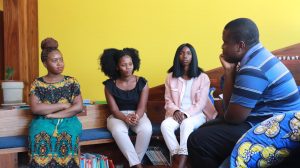
Young writers discussing An Emerging African Identity
Following this was the first session of the day titled ‘An Emerging African Identity’. The panelists were young Zambian writers including Ms. Fiske Serah Nyirongo, who contributed an article to Twaweza, a collection of twenty-four non-fiction African stories, published this year by the African Writers Development Trust and is available for free download. Moderated by journalist and radio personality Mr. Jacob Kabwe, some of the issues tackled were how emerging writers describe African identity, how world events have changed African identity and how much control we have had in forging the identity we have as Africans. The discussion brought out identity as being complex and dependent on who defines it.
There’s the Euro-centric view of Africa, based on prejudice, slavery and colonialism, with Africans being in the peripheral of any and all narratives. There’s the Afro-centric view, which is about centering Africa and Africans in narratives, and there’s the Africanist view, which is unique in its own space and is about bringing balance to how we see ourselves. Christianity, Islam and colonialism were identified as the greatest influences on Africans and Africa. The fear is also that in fifty years’ time, our languages will be lost to English and we may be fighting for spaces in majority-white countries.
The afternoon session was on ‘The Media Perspective’. Mrs. Victoria Chitungu, historian, author, previous Director of Lusaka National Museum and current curator of Choma Museum spoke about the value and priority that we place on ourselves as Africans in media spaces. For instance, on Zambia’s national television broadcaster, ZNBC, there is an hour of news in English. In contrast, the news in Zambia’s seven main local languages is allotted five minutes each, and is presented in succession. An hour in English of information being given to the public and only five minutes of that same information in Lozi, Nyanja, Luvale, Tonga, Bemba, Kaonde, Chewa. Publisher, onomastician, cultural heritage expert, founder and series editor of the Encyclopedia of African Names, Mr. Chanda Penda spoke about private media being more about politics than arts. There is a neglect in favour of sensational headlines that are political or scandalous in nature; things that are seen as commercially more viable than the arts, especially books and writers.
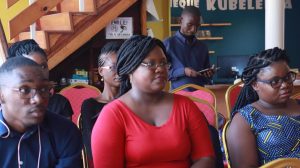
Some participants at the conference
Read – 2018 African Writers Conference Lights up Abuja
On the last day of the conference, the first session’s title was ‘The African Identity- An Academic Discourse’. Intangible Cultural Heritage Expert (UNESCO Certified), poet, lecturer and founder of Kalulu Kreativez, Mr. Gankhanani M Moyo submitted that all cultural spaces are interlinked and borrow from each other; therefore, there is no such thing as cultural purity. He added that political identity and boundaries are a false sense of identity for the African. For instance, the Chewa ceremony, Kulamba, in Zambia always has people coming from Mozambique and Malawi to take part in it.
For the African writer, what is important to know is that identity is fluid, it is not static. One writes because someone else has written; this means we have to be aware of our cultural spaces to be able to write from within them. The role of the writer is to explore complexities, to question our reality, our space and inter-relations between now, yesterday and tomorrow. The writer should not be boxed into ‘this is the beginning and this is the end’.
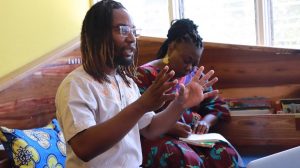
The speakers – Mr Moyo and Mrs Chitungu
Mrs. Chitungu, who spoke after Mr Moyo, posited that Euro-centrism informs academic discourse when it comes to writing. The centres of power are European academic institutions. As a result, this creates a bias because the measuring tape for quality and accepted (and acceptable) work is not here in Africa and it is not African. The question is then put: how do we talk of an African identity in academic discourse if the measuring stick is not African? How do we change the narrative? The authorities referenced and consulted in African academic work more often than not are not Africans. In pre-colonial times, Africans were grouped into clans, not tribes. Clans cut across cultural groupings in terms of language, but with the arrival of the Europeans, Africans became categorised under ‘tribes.’
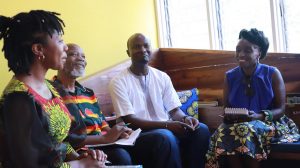
Panel discussion moderated by Marita Banda
A panel discussion to wrap things up followed. This included Mrs. Natasha Omokhodion-Kalulu Banda, author of No Be From Hia, Mr. John T. Njobvu, renown actor, economist, civic activist and poet, as well as Mr. Chanda Penda. Mrs. Omokhodion-Kalulu Banda emphasised the importance of using the rich information of our heritage in museums and national archives to mine new stories about ourselves and our identity. Mr. Njobvu urged the attendees to embrace traditional dresses and African names. Mr. Penda reminded the audience to take up the fight for a positive African identity and not look to the West or Europe to tell our stories, in academia and in general.
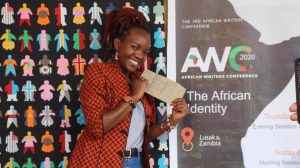
Halieo Motanyane – 2nd runner-up
To cap it all off was the vote of thanks by Mr. Anthony Onugba, as well as the announcement of the winners of the 2020 African Writers Awards. For Creative Non-fiction, Oladejo Oluyemisi from Nigeria won for Each Little One. Poetry was won by Duru Nneka Joyce, Nigeria, for Ode to the Blackbird (Haiku). The Drama Award went to Asoloko Gloria Akayi, Nigeria, for Who Knows Amanda? This year the Wakini Prize for Children’s Literature was expanded to include three winners. First Prize went to Madeha Ezekiel Malecela from Tanzania for Scared Little Boy. The second went to Blessing Aliyu Tarfa from Nigeria for Sophie, What Do You Say? The third prize went to Halieo Motanyane from Lesotho for Hessy and the Lost Tooth. Halieo, who is also a passionate filmmaker, travelled to Zambia, especially for the conference. On hand to present a visibly shocked Halieo the award was Zambian Marjorie Moono Simuyuni, winner of the maiden edition of the Wakini Kuria Prize for children’s Literature in 2019. Attending the conference too was Andrea Matambo, who won the 2019 African Writers Awards for Poetry.
This 3rd African Writers Conference in Lusaka was a vibrant, exhilarating and profound event. The onus is on the African writer to grapple with uncomfortable truths, take the baton and be the change agent in the narratives that are put out there about Africa and about Africans. In the words of President Obama, “we are the change we’ve been waiting for.”
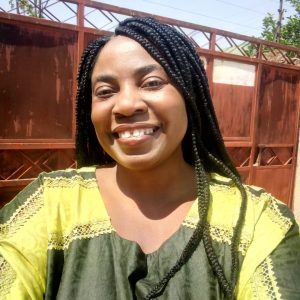
Namwanja Margaret Chikwabi is a Travel Consultant turned freelance Book Editor. She runs Rosebud Editing & Proofreading Company. The company offers editing and proofreading services for books, magazines, academic papers, articles, etc. She co-founded and was Editor in Chief of Arise Zambia Magazine. This is Zambia’s first ever youth-dedicated magazine published by the Seventh-day Adventist Church in 2015. She is currently the Assistant Chief Editor of Writers Space Africa (WSA) Magazine.
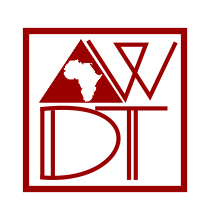
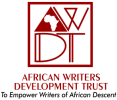
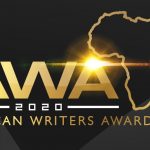
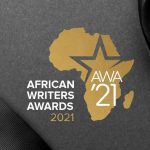
God is great and congratulations to the winners
Well articulated.
Thanks for the challenges herein.
Thank you!
Beautiful write-up Namwanja! You inspire me to tap deeper into my potential. Well done!!
I’m so glad to hear that! We need your voice and your pen out there Selina!
Well written to cater for those that missed both physical and virtual proceedings. Thank you so much.
Thank you. That was the intention. Glad you saw that!
“For the African writer, what is important to know is that identity is fluid, it is not static” powerful words thanks🙌